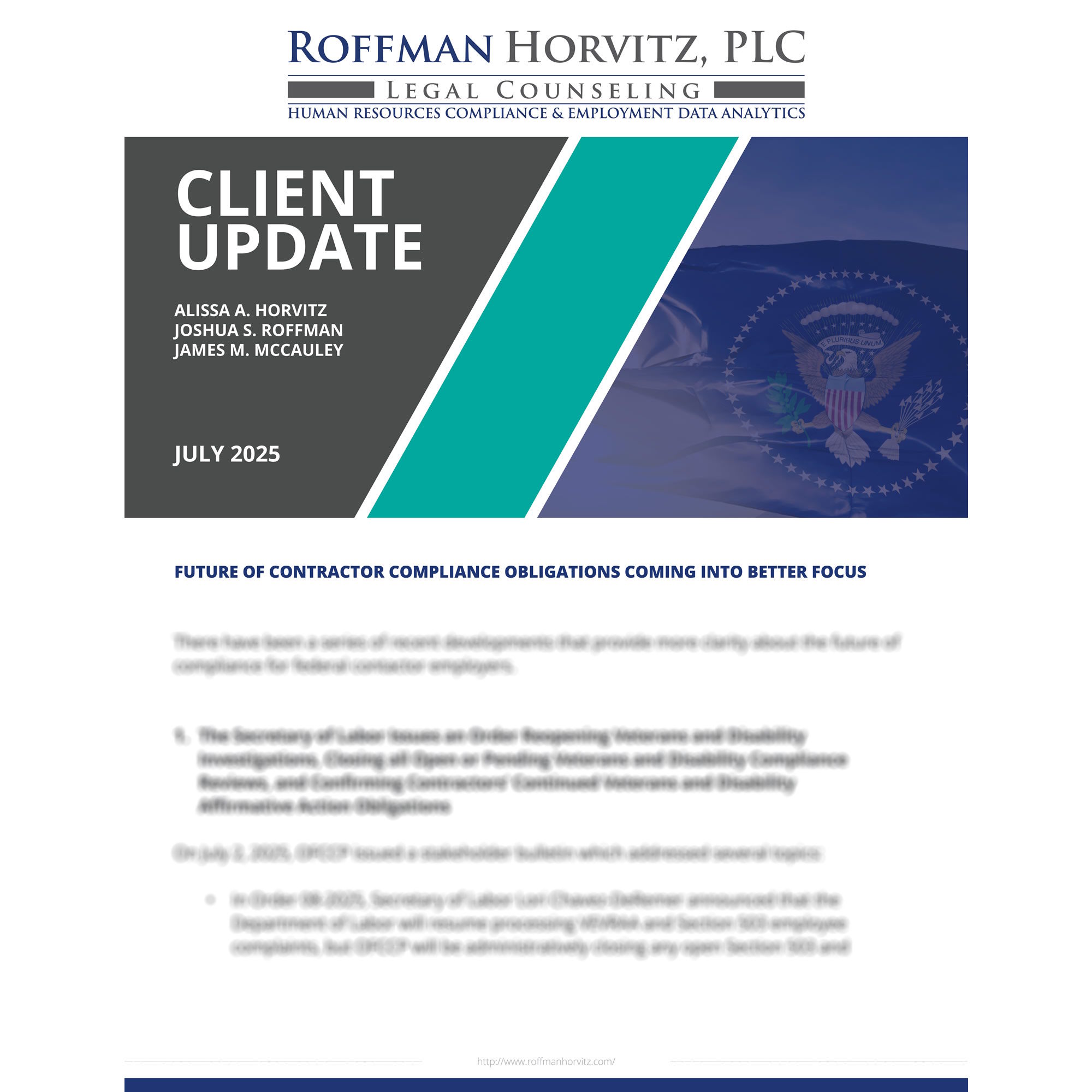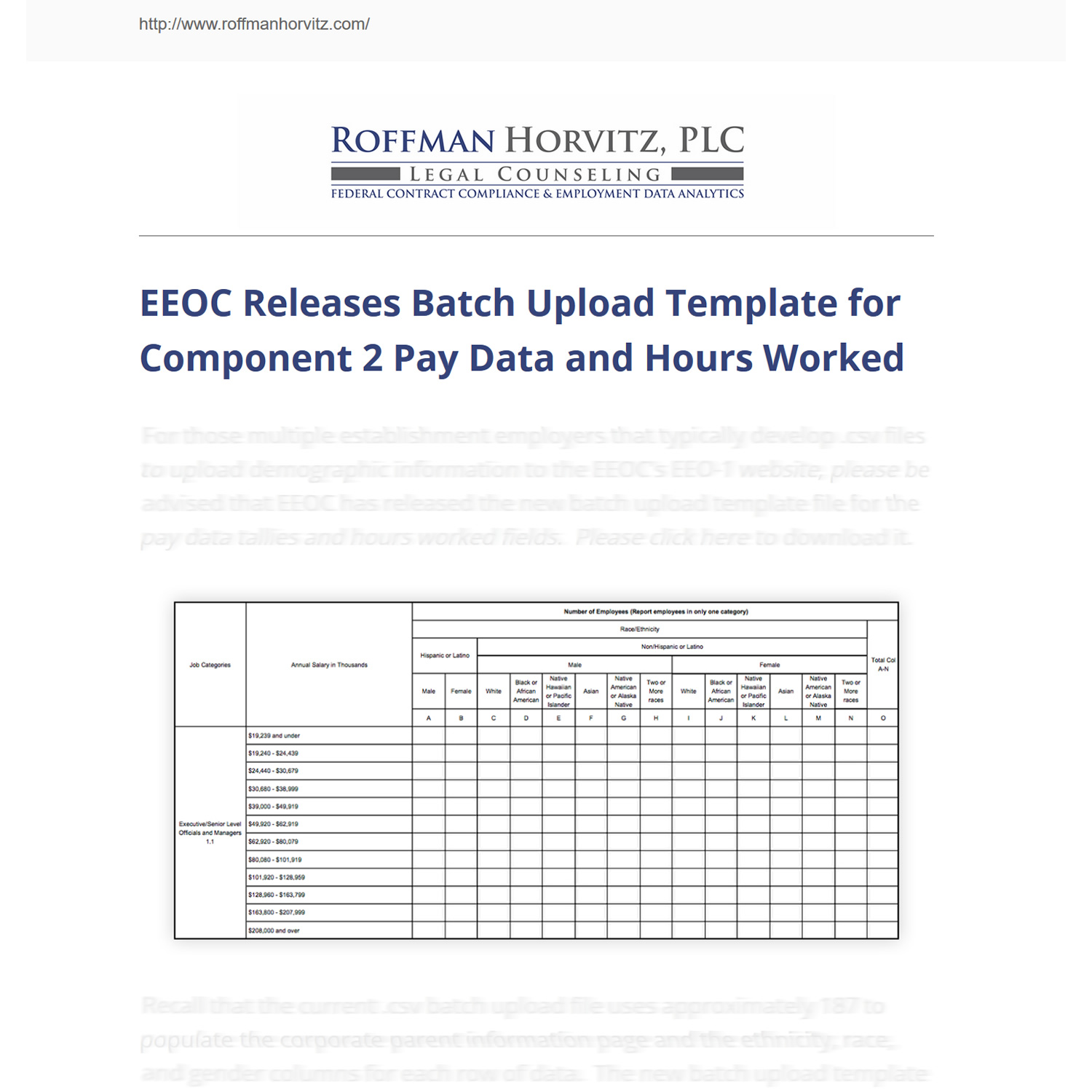Client Update: OFCCP Proposes New Audit Scheduling Letter and Itemized Listing; Contractors Encouraged To Submit Objections to Burden

OFCCP is proposing a new supply and service contractor compliance review scheduling letter (the letter it uses to begin an audit). Contractors have until January 20, 2023 to comment. The proposed letter represents a significant expansion in the amount of data that OFCCP is requesting in the initial desk audit submission. OFCCP's estimated time for contractors to gather the materials and respond to this new scheduling letter is only 39 hours, compared to the current estimate of 28 hours, neither of which is realistic, in our opinion.
Major Changes: Scope of Audit for Post-Secondary Institutions or Contractors with Campus-Like Settings
The proposed letter greatly expands the scope of the compliance review for post-secondary institutions or contractors with campus like settings. The desk audit submission must include the requested information for all AAPs for campuses, schools, programs, buildings, departments, or other parts of the institution or company located in the city and state selected for audit. Post-secondary institutions and contractors with campus like settings will need to submit data for multiple AAPs, and the OFCCP will likely seek to aggregate the data for analysis.
If you are an academic campus that has multiple AAPs pursuant to OFCCP's Educational Institution Technical Assistance Guidance, we implore you not to remain silent about the estimate of burden hours it would take your organization to respond to the letter.
Major Changes: Executive Order Itemized Listings
New proposed #7 requests a list of action-oriented programs designed to correct problem areas identified pursuant to 41 CFR 60-2.17(b).
- In 60-2.17(b), contractors are required to evaluate personnel activity (applicant flow, hires, terminations, promotions, and other personnel actions) and conduct a compensation analysis to determine whether there are disparities.
- If the contractor discovers disparities, it is required to develop action-oriented programs to correct the problems.
- Many contractors conduct these analyses under privilege, and while OFCCP is not requiring contractors to submit the results of privileged analyses, the new listing effectively will require contractors to disclose whether problem areas were identified and how the contractor attempted to address them.
- If you don't identify the problems, and you don't identify any action-oriented programs to address them, OFCCP can easily cite the employer for technical violations in the audit.
Major Changes: Section 503 and VEVRAA
OFCCP is proposing to require additional documentation from contractors to respond to the Section 503 and VEVRAA itemized listings.
- Old itemized listings 7 and 11 request the evaluation of the effectiveness of outreach and recruitment for individuals with disabilities and protected veterans.
- New proposed listings 8 and 12 specify that the response must include the criteria used to evaluate each outreach effort, and whether each effort was effective.
- Additionally, contractors must include a determination of whether the totality of the efforts were effective, and if not, what actions were taken to identify and implement alternative efforts.
- If OFCCP's proposal is adopted, contractors will not be able to rate an initiative as “effective” or “ongoing” without also listing the criteria used to arrive at that rating
- Old Itemized Listing 10 requests the contractor's disability utilization percentages.
- If the contractor does not have 7% individuals with disabilities in each AAP job group, new itemized listing 11 requires the employer to provide descriptions of steps taken to determine whether and where impediments exist if underutilizations were identified. The response to this expanded itemized listing must include
- the assessment of personnel processes,
- the evaluation of effectiveness of outreach, and
- the results of the AAP audit.
- Because most contractors still do not have 7% individuals with disabilities in every job group, they will have to plan throughout the year to document these initiatives; but “the results of the AAP audit,” is ambiguous.
Major Changes: Support Data – Promotions and Terminations
- OFCCP expects all employers to distinguish between competitive and noncompetitive promotions.
- A competitive promotion is when the employer posts the opening and requires employees to compete for the opportunity
- A noncompetitive promotion could be a ladder or career progression, or it could be a promotion that management awards at its discretion, without requiring employees to apply for the opportunity. (Sometimes referred to as tap-on-the-shoulder promotions)
- Employers will have to submit the previous and current supervisor, previous compensation, current compensation, department, job group, and job title. This means that contractors will not be producing summary data at the outset of the audit but instead will be producing line-item promotions data in order to supply these other variables.
- The listing also requests documentation that includes established promotions policies and practices for the organization.
- The proposed letter also expands the itemized listing requesting Terminations to require that the terminations are broken down by termination reason. The letter does not say, “break them down into voluntary and involuntary buckets”; it asks for the data by reason code. For employers that have dozens of termination reason codes, the termination tables are doing to be more complicated.
Major Changes: Compensation
Consistent with Director Yang's prioritization of pay equity enforcement, the most significantly expanded areas of the proposed scheduling letter are in the listings regarding compensation and compensation analyses.
- The employee level compensation data currently requested in itemized listing 19 is required for the date of the end of year snapshot from both the current and previous AAP.
- The suggested data points for employees in the compensation set are slightly expanded in the proposed letter.
Additionally, contractors will be required to provide each of the suggested data points, or notate that the items are not tracked. Which converts the list into somewhat of a mandatory submission, not a permissive submission.
- The employee level compensation data for this itemized listing now must include temporary provided by staffing agencies, even though these employees would typically be outside of the scope of an AAP.
- Contractors also will be required to identify:
- when the analysis by gender and ethnicity was completed,
- the number of employees and categories included and excluded,
- the forms of compensation analyzed, and
- the method used for the analysis.
- While the directive stated that the OFCCP may request the data if the desk audit revealed disparities or other compensation concerns, the proposed letter would request the data in all audits.
Minor Changes
- The proposed letter slightly expands the itemized listings for accommodation requests and the assessment of personnel processes.
- The itemized listing requesting accommodation requests and outcomes will have a new requirement to provide six-month update data if the letter is received more than six months into the AAP cycle
- The recent assessment of personnel processes will require the employer to identify impediments to EEO and any modifications made to remove those impediments.
- Two new proposed itemized listings will request further documentation to explain screening processes and EEO policies.
- The first new itemized listing requests documentation of policies and practices for all employment recruiting, screening, and hiring mechanisms. It specifies that this response should include artificial intelligence, algorithms, automated systems, or other technology-based procedures.
- The second new itemized listing requests documentation of EEO policies including antiharassment policies, employment agreements, and arbitration agreements that would affect equal opportunity complaints.
- These itemized listings have the potential to require broad submissions to respond, and it is unclear how OFCCP will evaluate the documentation provided. These requests are likely a way for OFCCP to evaluate what procedures, technologies, and policies the contractor community is using. While this information may be valuable to the OFCCP, it will also be burdensome to compile and submit.
In sum, the proposed letter represents a significant expansion of the data OFCCP would like contractors to collect and provide for an initial desk audit submission.
- Contractors will need to collect additional documentation on action-oriented programs, internal policies, recruiting and screening processes, and identified problem areas or impediments to equal employment opportunity.
- Based on OFCCP's 2022 revised compensation directive and the proposed itemized listings requesting documentation that the contractor performed an in-depth analysis, contractors are incentivized not to conduct a regression analysis to satisfy the requirement under 60-2.17(b)(3).
- Contractors should conduct a regression analysis under privilege on the employee level pay data prior to submitting it to the OFCCP in a desk audit submission, but not for the purpose of satisfying 2.17(b)(3).
- Compiling the employee level compensation data including all of the data points requested by the OFCCP and conducting regression analyses on the data prior to submission is often the most time-consuming part of responding to the scheduling letter.
- OFCCP is now proposing that contractors respond for two snapshots rather than just the snapshot in the current AAP
- The populations will not match for both years
- The OFCCP wants temps and other non-employees included in compensation, but they are not in the workforce analysis for the AAP, creating further inconsistencies
- Additionally, the proposed letter is requesting a greater volume of data and new types of information and documentation.
- Post-secondary institutions and contractors with campus like settings may have the compounded burden of having to submit the requested data for multiple AAPs.
- The OFCCP's estimate of 39 hours to respond to the letter recognizes that the proposed letter will increase the burden on contractors, but understates the degree.
- Contractors are not being given an extension of the 30 days to respond to the letter despite greatly increasing the volume of the submission contractors must compile.
- The impact of this proposal is greater in light of OFCCP's previously-issued enforcement directive 2022-02 that rescinded the automatic extension for support data submission and allows extensions only in extraordinary circumstances.
- Compliance reviews already are long and drawn out over several years in some OFCCP districts; the impact of these new front-loaded submissions likely means in even longer audits.
The supporting documentation and proposed scheduling letter can be accessed here:
https://www.federalregister.gov/documents/2022/11/21/2022-25311/supply-and-service-program-proposed-approval-of-information-collection-requirements-comment-request
Comments are due by January 20, 2023. Roffman Horvitz is working on a template set of objections and expects to circulate them by January 9, 2023.
Download PDF of Client Update

